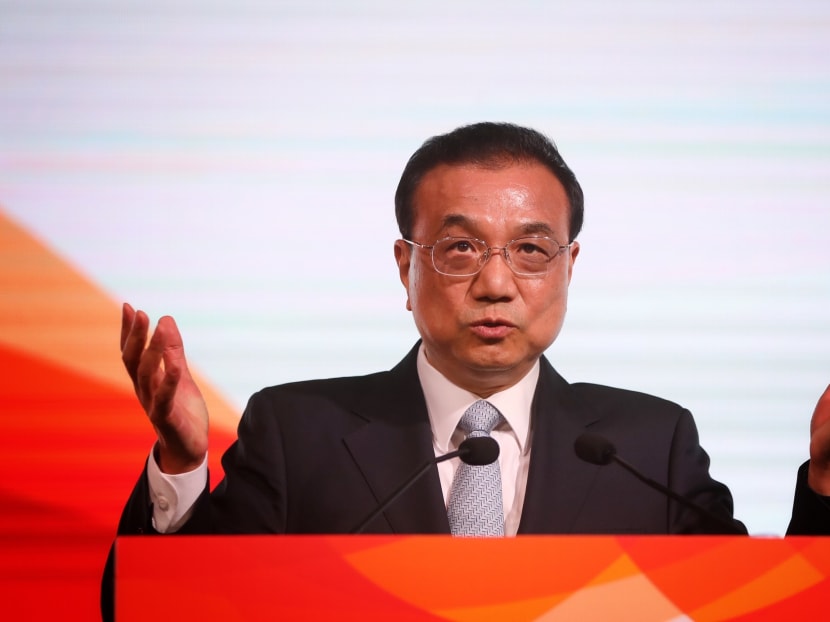China vows to make trade ‘fairer’
SINGAPORE — In the face of a biting trade war with the United States (US), China pledged on Tuesday (Nov 12) to make trade fairer in order for it to be sustainable.

Chinese Premier Li Keqiang at a welcome banquet organised by the Singapore Business Federation and Singapore Chinese Chamber of Commerce & Industry.
SINGAPORE — In the face of a biting trade war with the United States (US), China pledged on Tuesday (Nov 12) to make trade fairer in order for it to be sustainable.
Speaking to more than 500 people at the 44th Singapore Lecture at the St Regis Singapore Hotel, Chinese Premier Li Keqiang stressed the importance of fair trade, and reiterated China’s openness to working with other countries in this regard.
Adding that sustainable development hinges on fair trade, he said: “Trade that is not fair will not be sustainable."
Mr Li, who arrived in Singapore on Monday for his first official visit here as premier, added that negotiations on the ambitious Regional Comprehensive Economic Partnership (RCEP) are expected to conclude next year.
The countries participating in the trade pact are set to meet at the RCEP Summit in Singapore in the coming days, and will announce they have made “substantial progress” in negotiations, said Mr Li.
The partnership between the Association of South-east Asian Nations’ (Asean) 10 member states, Australia, China, India, Japan, New Zealand and South Korea will create the world’s largest trading bloc, covering a third of the world’s present annual gross domestic product.
Amid rising protectionism and strains on free trade, Mr Li said there is a need to advance the RCEP, which will deliver “real benefits to the region” and signal that the countries involved stand behind free trade, and are forging ahead with concrete actions.
Returning to the topic of free trade several times during his lecture, Mr Li said that it had been critical to China’s opening up, and countries such as Singapore have also thrived from it.
Free trade has played a big part in averting wars and enabling people to draw on one another’s strengths for “win-win results”, he added.
Even as China is embroiled in a tit-for-tat trade war with the US, Mr Li said his country is confident in the wisdom of its people and the Americans in finding a mutually acceptable solution. To resolve their differences, they must respect each other’s core interests and key concerns, he said.
In September, Washington handed down its latest round of tariffs on US$200 billion (S$277 billion) worth of Chinese products, prompting China to retaliate with tariffs on US$60 billion worth of American goods.
Mr Li reiterated that multilateralism, free trade, and a rules-based international order have reduced poverty and preserved peace for the past several decades.
Deputy Prime Minister Teo Chee Hean, who opened the lecture and moderated a question-and-answer session with Mr Li, said China plays a leading role in tackling global challenges such as climate change, as well as advancing free trade and open markets.
“This is important as China’s growth trajectory can only be maintained if a rules-based multilateral order and international norms continue to be upheld,” said Mr Teo.
Wading into US-China trade tensions, Mr Teo said relations between the two world powers continue to be the Asia-Pacific’s defining relationship, and it was in “everyone’s interest” that their relationship stays positive and constructive.
“The escalating cycle of tariff measures by both sides could negatively impact the multilateral trading system and potentially impact broader relations,” Mr Teo said.
“As a friend of both China and the US, we hope that both sides will work together to resolve their differences, to the benefit of China, the US and the rest of the world.”
In his speech, Mr Li also touched on negotiations for a code of conduct on the South China Sea, as he expressed China’s willingness to work towards “enduring peace”.
The strategic waterway has been a longstanding flashpoint in the region due to competing territorial claims by China and several South-east Asian countries.
Earlier this year, China and Asean agreed on a single text as the basis for negotiations on the code of conduct.
China intends for negotiations to wrap up in three years, said Mr Li.
On China’s attitude towards its neighbours, a topic the Chinese premier said was on the minds of many, Mr Li said his country will stay firm on the course of peaceful development.
“We value peace, and won’t do unto others what we don’t want done unto us,” he said, noting that China does not seek hegemonic influence, and hopes to have a “harmonious relationship” with its neighbours.











